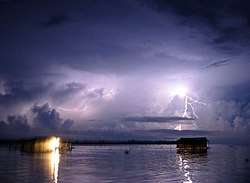Zulia
Zulia State (Spanish: Estado Zulia, IPA: [esˈtaðo ˈsulja]; Wayuu: Mma’ipakat Suuria) is one of the 23 states of Venezuela. The state capital is Maracaibo. As of the 2011 census, it has a population of 3,704,404, the largest population among Venezuela's states. It is also one of the few states (if not the only one) in Venezuela in which voseo (the use of vos as a second person singular pronoun) is widespread. The state is coterminous with the eponymous region of Zulia.
Zulia State Estado Zulia | |
|---|---|
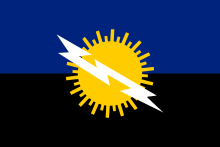 Flag 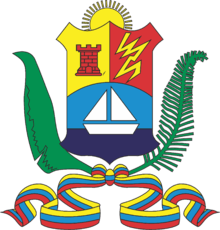 Coat of arms | |
| Anthem: Sobre Palmas | |
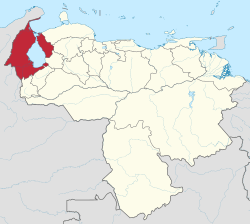 Location within Venezuela | |
| Coordinates: 9.84°N 72.25°W | |
| Country | Venezuela |
| Created | 1864 |
| Capital | Maracaibo |
| Government | |
| • Body | Legislative Council |
| • Governor | Omar Prieto (2017–present) |
| • Assembly delegation | 15 |
| Area | |
| • Total | 50,230 km2 (19,390 sq mi) |
| Area rank | 5th |
| 6.92% of Venezuela | |
| Population (2017 estimate) | |
| • Total | 5,125,579 |
| • Rank | 1st |
| • Density | 100/km2 (260/sq mi) |
| 18.29% of Venezuela | |
| Time zone | UTC-04:00 (VET) |
| ISO 3166 code | VE-V |
| Emblematic tree | Coconut (Cocos nucifera) |
| Website | web |
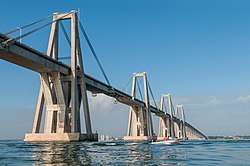
Zulia State is in northwestern Venezuela, bordering Lake Maracaibo, the largest body of water of its kind in Latin America. Its basin covers one of the largest oil and gas reserves in the Western Hemisphere.
Zulia is economically important to the country for its oil and mineral exploitation, but it is also one of the major agricultural areas of Venezuela, highlighting the region's contribution in areas such as livestock, bananas, fruits, meat, and milk.
Geography
The Lake Maracaibo Basin covers the large to the north and west, from the Guajira Peninsula to the Perijá Mountains. Venezuela's Andean states of Táchira, Mérida and Trujillo border Zulia State at the southern end of Lake Maracaibo.
The name Venezuela comes from the lake. When Spanish conquistadors sailed into the area, they found the indigenous peoples living in communities of huts supported by stilts along the shores of the lake. They were reminded of Venice and named the place "Little Venice" or Venezuela.[1] The lake has a number of islands, some of which are populated.
Near the mouth of the Catatumbo River, where it empties into Lake Maracaibo, is the famous Catatumbo lightning (Relámpago del Catatumbo)[2] which is represented on the state's flag and coat of arms by lightning bolts.
Toponymy
There are several competing theories about the origin of the state's name. One is that Guaimaral, son of the cacique Mara, was on pilgrimage in the Pamplona region, where he fell in love with the beautiful Zulia, but she was killed in a battle against the conquerors. Gaimaral sadly returned to his father's domains, naming rivers, towns and regions for his lost love there is little historical proof, but that is the most popular theory.
Alternatively, it had been said that the state was named after the Zulia River, known in Colombia as Batatas, which leads into the Catatumbo River. Another story says that both names, river and state, came from the princess Zulia, daughter of a famous cacique Cinera. He was an important leader of a tribal federation located in what is now Colombia's Norte de Santander Department, and the princess Zulia was well known for her physical and moral qualities, formidable temper, and bravery.
History
The area that is now Zulia was first seen by Europeans in 1499 during an expedition commanded by Alonso de Ojeda. During the Spanish colonial period, its lands were part of the Venezuela Province until 1676, when its lands were added to the Province of Mérida del Espiritu Santo de la Grita,[3] becoming the province Espiritu Santo de Maracaibo, or Maracaibo Province.[4] In 1789, the province covered the territory of the current Venezuelan states of Zulia, Apure, Barinas, Táchira, Mérida and Trujillo. In 1810, Mérida and Trujillo were separated as new provinces.
Zulia Province declared independence from Spain on January 28, 1821. During the Gran Colombia period in 1824, it received the name of "Zulia Department", honoring the Zulia River. With the dissolution of Gran Colombia in 1830, it was named Maracaibo Province and was one of the 11 provinces of Venezuela.
Venezuela's federal constitution, April 22, 1864, changed the denomination of "province" to "state", creating the State of Maracaibo on the same territory as the province. At the end of the same year, the state's legislation determined to change the name to the Sovereign State of Zulia, but that lasted only a few months.[5] In 1874, its name again became Zulia State. Federal government orders in 1881 created the combined Falcón Zulia state. Its autonomous state status continued until April 1, 1890, when congress legislated the separation of the Falcon-Zulia State. It suffered further territorial changes towards the end of the 19th century, until the current delimitation in 1899 was finally drawn. Since that time the name has remained Estado Zulia.
Climate
In the northern sector a semi-arid climate prevails, with an irregular pluviometric regime. The annual medial precipitation registered in Maracaibo city is between 358 and 665.99 mm (14.094 and 26.220 in), with a median temperature of 28 °C (82 °F). The precipitation rates increase in the western and eastern regions of Lake Maracaibo, forming a wet tropical savanna climate, with annual average temperatures from 27°C to 28°C, and rainfall exceeding 1,000 mm (39 in) registered in Mene Grande. In the southern lake region, increased rainfall conforms to a tropical rain forest climate with an annual average precipitation of 2,556 mm, and surpassing 3,500 mm per year in the heights of Serrania de Perija.[6]
Government and politics
Like other states, the structure of the government of Zulia is laid out in the Constitution, the highest law in the state.
The Governor of Zulia is in charge of the government and administration, serves for a four-year term and can be re-elected to an additional term only immediately and only once.
The state legislature is made up of a single body, the Legislative Council. It has the power to pass the state's Budget Law.
Like the other 23 federal entities of Venezuela, the State maintains its own police force, which is supported and complemented by the National Police and the Venezuelan National Guard.
Municipalities and municipal seats
Zulia is divided into 21 municipalities (municipios):
|
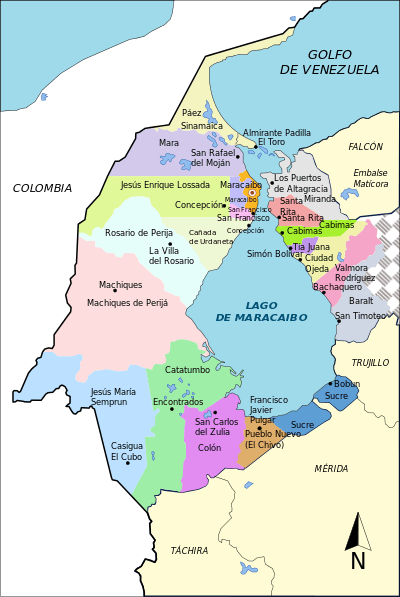 Zulia by Municipios |
Population
Sports
The state is home to the Gaiteros del Zulia, 4-time Champion of the Liga Profesional de Baloncesto, Venezuela's top professional basketball league. The team plays its home games at the Gimnasio Pedro Elías Belisario Aponte in Maracaibo.
References
| Wikimedia Commons has media related to Zulia. |
- Peter K. Austin, ed. (2008). One Thousand Languages: Living, Endangered, and Lost. Berkeley: University of California Press. p. 213. ISBN 9780520255609.
- Foer, Joshua (February 8, 2011). "An Everlasting Lightning Storm". Slate. Retrieved 3 January 2013.
- Dictionary of European Imperialism
- (in Spanish) Venezuela Barinas supreme court Historic references
- (in Spanish) Dr. Ernesto Garcia McGregor, Government of Zulia, History of the Zulia state Archived September 11, 2008, at the Wayback Machine
- Venezuela's Gobierno en Linea web page -Perfil Zulia Archived September 11, 2008, at the Wayback Machine
- "Resultado Básico del XIV Censo Nacional de Población y Vivienda 2011 (Mayo 2014)" (PDF). Ine.gov.ve. p. 29. Retrieved 8 September 2015.
